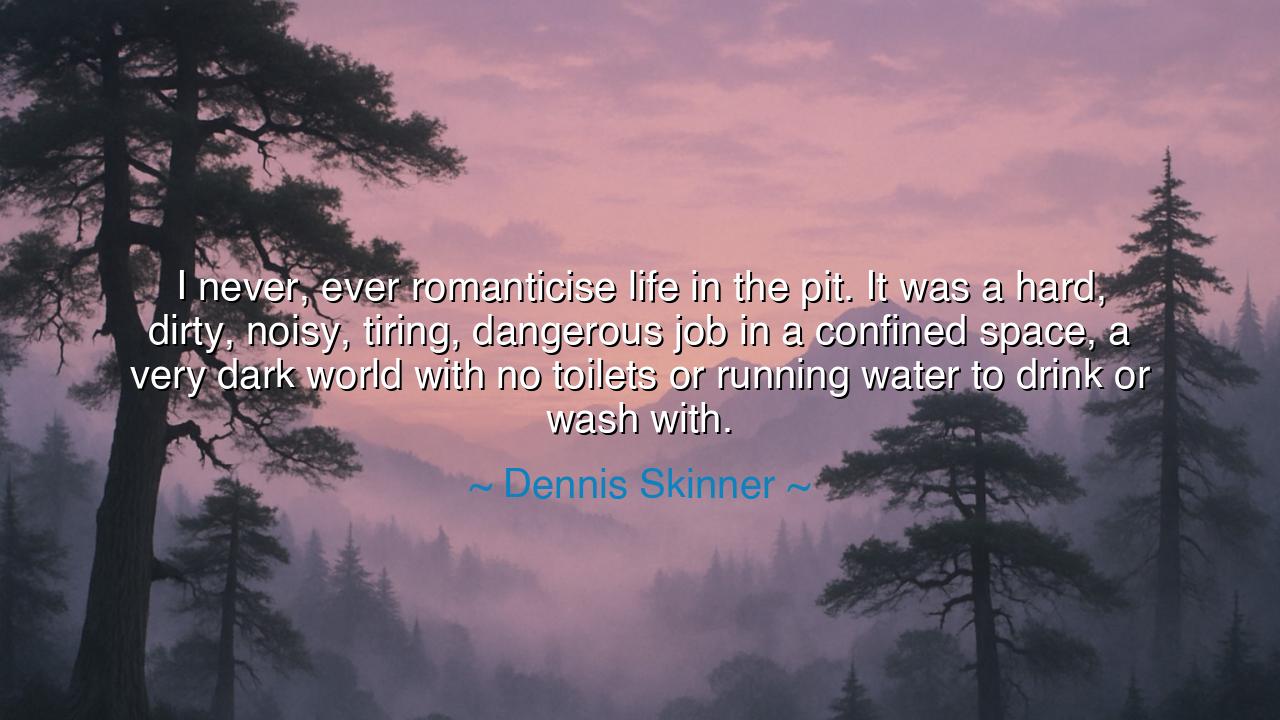
I never, ever romanticise life in the pit. It was a hard, dirty
I never, ever romanticise life in the pit. It was a hard, dirty, noisy, tiring, dangerous job in a confined space, a very dark world with no toilets or running water to drink or wash with.






Hear now the words of Dennis Skinner, a man whose life was shaped by the hard, unyielding realities of working in the mines: "I never, ever romanticise life in the pit. It was a hard, dirty, noisy, tiring, dangerous job in a confined space, a very dark world with no toilets or running water to drink or wash with." In these words, Skinner speaks of a world that is far removed from the idealized visions that often surround labor, especially labor in the mines—a world that is harsh, brutal, and unforgiving. There is no romance in the pit, no glory in the sweat and struggle that define it. Only the reality of toil, of danger, and of survival.
The ancients knew well the importance of understanding the truth of one’s labor. Consider the slave labor of ancient Egypt, where workers were driven to build the great pyramids under grueling conditions. Though the pyramids themselves were often romanticized as monumental achievements, the lives of those who built them were fraught with suffering. It is said that the workers, laboring in the heat of the Egyptian sun, worked long hours in conditions that would have broken most men. Their work was not glamorous; it was harsh and dangerous. Yet, they labored to create something that would last for millennia. This speaks to the same truth Skinner conveys—there is little glory in hard labor, yet it is the foundation upon which all progress is built.
In Skinner's reflection, we find not only a rejection of the idealization of labor but also a recognition of the dignity in doing difficult work. The work in the pit was not easy, nor should it be viewed through the lens of heroism or romance. It was brutal, and yet, it was the backbone of society. Every day, the miners risked their lives in the darkness to provide for their families and to fuel the engines of the industrial revolution. These men and women labored not for the glory of their work but for the survival and well-being of the world around them. Their sacrifice was not about recognition; it was about necessity.
Think of the tale of Hephaestus, the Greek god of fire and forge, who, though he was a master craftsman, labored in the depths of his volcanic workshop. His work was hidden, his world dark and oppressive. Yet, from the darkness of his forge, Hephaestus created wondrous artifacts, imbuing them with divine power. His work was dangerous, and he labored in isolation, not for admiration, but for the creation of something greater than himself. Just as Hephaestus toiled in darkness, so too did the miners labor in the depths of the earth—working not for the praise of others but for the fulfillment of a critical role in their society. The sacrifice was in the labor, and in that labor, they found their purpose.
Skinner’s words remind us of an essential lesson: that labor, especially the hard and dangerous kind, is not glamorous or romantic. It is often dirty, tiring, and fraught with risk. But it is also the foundation of society. It is through the sweat and sacrifice of the working class that the world moves forward. Just as the ancient builders of great monuments gave their sweat and blood for the sake of something larger than themselves, so too do the miners labor for the fuel that powers the engines of industry. Their contribution is not shouted from the rooftops, but it is a foundational piece of the world we live in.
The lesson here is not to romanticize the struggles of those who labor in harsh conditions, but to acknowledge and honor their dignity. We must not overlook the sacrifices made by those who do the difficult work—those who endure the darkness, the dirt, and the danger. Their work is not done for glory, but for necessity, and in that necessity lies a deep, unspoken strength. As citizens, we must not forget the contribution of the laborers, the silent heroes who sustain the world without seeking recognition.
Therefore, I urge you, dear listener, to understand that true strength lies in the ability to endure and to give without expectation. Recognize the worth of hard labor, not for the romance it might promise, but for the sacrifice it requires. In every task, no matter how menial or difficult, there is dignity. Honor the work of those who struggle in darkness for the good of others, and take pride in your own efforts, knowing that labor, when done with purpose, holds value far beyond what the eye can see. The world is built on the shoulders of those who toil, and it is through their sacrifice that the foundations of civilization stand strong.






AAdministratorAdministrator
Welcome, honored guests. Please leave a comment, we will respond soon